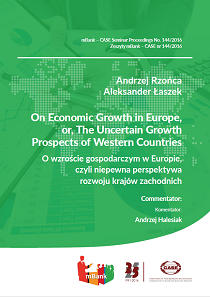On Economic Growth in Europe, or, The Uncertain Growth Prospects of Western Countries
Growth in the European Union since the outbreak of the global financial crisis is slower (1) than before the crisis, (2) than the trend would indicate, (3) than forecast and (4) than in the United States. The factors driving its weakness lie more on the supply side than the demand side. The loss of potential output after the crisis was exacerbated by inequalities from before the crisis; fiscal stimulus from 2007-2009, increasing public expenditure despite the lack of fiscal space; excessive liquidity support for banks; and inflexibility of the market for goods at the moment the crisis broke out. The problems with growth may deepen and become permanent if social support for anti-market parties continues to grow. Extremist parties are supported by divergence among the countries of the “old” EU and the slowdown of convergence in the new member states, as well as tendencies related to inequality, in particular the reduction of households’ mobility between income groups.
The 144th mBank - CASE Seminar Proceedings consist of the main paper "On Economic Growth in Europe, or, The Uncertain Growth Prospects of Western Countries" by Andrzej Rzońca and Aleksander Łaszek and the commentary "Economic Growth in Western Europe: The Investment Perspective" by Andrzej Halesiak.


